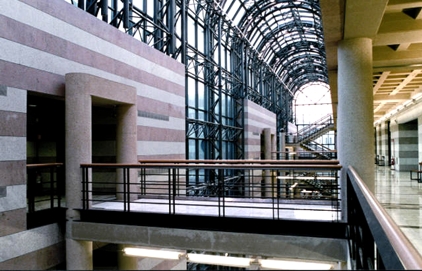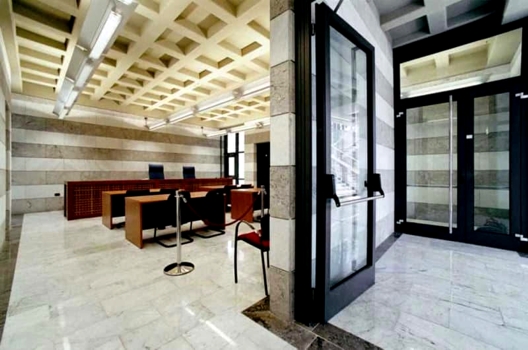
Category: The judiciary
Correcting Netflix 28 Omitted - The Case Against RS & AK Is Actually Getting Stronger Still
Posted by Peter Quennell
Pro-Guilt Trends
See the pointilist painting above? It consists entirely of dots. The more dots, the more it makes sense.
Justice can take its sweet time. But the global trend is for it to win out in the end. There is actually a huge industry that does what we do. Continue to harden cases dot by dot.
Primarily for that reason, opinion polls and surveys taken of the attitudes to specific crimes show that over time most of those attitudes trend toward guilt. Even Netflix can’t buck that.
Smoking Guns
This case is like that. Take a look at our new page. Created at popular request. The stark facts in any one of those posts is pretty well impossible to innocently explain away.
Eight of those 12 posts appeared - could only appear - in the past three years. New documents and new translation continue to arrive. The enormous Case Wiki and PMF and TJMK add more depth all the time.
Media Shortfalls
This goes on despite almost no help from US and UK media, who between them barely ever translated a single word. There was some fine reporting (see next posts). But major happenings in the case often got no reporting at all.
The blatant corruption of the Hellman appeal? No report. Sollecito’s telling second trip to the Dominican Republic? No report. Guede pointing more and more strongly at the pair? No report. Knox inevitably facing charges for the defamations in her book? No report. Her 400 lies there plus many more? No report.
The final vexatious outcome from the Supreme Court, which put Knox with blood on her hands right at the scene of the crime (the whole house)? No report. Sollecito’s two losses in court this year over his damages-award claim and his book? No report.
Bad books (think of PR shills Dempsey, Burleigh, Fischer, Heavey, Preston, Douglas, and Moore - as well as Sollecito and Knox) don’t stand the test of time. They are now really easy to shoot down. In contrast strong well-documented legal takes like James Raper’s book quietly move in. The BBC airs the best report done so far.
Inflection Point
Italians are strongly pro-guilt. Especially toward Knox, widely seen as the enraged and jealous prime mover and the killer of Meredith who wielded the final stab in the attack.
So we are pretty confident that the US and UK will see an inflection point in 2018. Just sayin’ Netflix.
Correcting Netflix 29: Which Took A Harder Line Against Sollecito & Knox? The Prosecutors Or The Courts?
Posted by Our Main Posters

Above and below, one of Italy’s ultra-modern courthouses, this one in Palermo
1. Post Overview
Continuing our series on the myriad ways the dishonest Netflix team misled.
“For The Press. September 09, 2016: The Netflix documentary “Amanda Knox” opens at the Toronto International Film Festival today Amanda Knox. While claiming to be a balanced perspective its producer Stephen Robert Morse had made inflammatory reports about the prosecutor Giuliano Mignini (who was interviewed by the film makers) of “having been convicted of crimes” (he was acquitted) and being “a power-hungry prosecutor running the show”.
That was a press release our Wiki team put out which set this series on the road. If you got your information on the case from Netflix, you may have wrongly assumed it was the demonized prosecutor Dr Mignini calling all the shots. But read Dr Mignini here and here.
And read what Netflix darling Amanda Knox did to Dr Mignini here. (Oh, did Netflix not tell you that?!)
2. Where Power Lies
Prosecutors in the Italian system are among the less empowered anywhere in the world (though usually smarter too). The harder line in the Perugia case was always taken by the judges in the Perugia, Florence and Rome courts.
Judge Micheli was the judge who late in 2008 sentenced Guede (to 30 years) and actually decided to send Knox and Sollecito to trial. (Oh, did Netflix not tell you that?!)
He was one tough judge. Read summaries of his very tough report here, here, and here.
Italian judges are almost all career path (think: carefully trained, and promoted on their merits) whereas almost all American prosecutors and judges are either elected or appointed by the political party in power, at times without even a degree in law.
Italian prosecutors cannot plea-bargain as happens in over 90% of all American cases - resulting in an estimated 200,000-plus sitting wrongly in American prisons. Italian equivalent: around zero. (Oh, did Netflix not tell you that?!)
In his book Sollecito said the prosecution tried to plea-bargain for him to roll over on Knox. Not only was that a lie, but Sollecito has now admitted it was a lie in a Florence court. .
Unlike American prosecutors, Italian prosecutors are forbidden from going on TV or holding press conferences while any legal process goes on.
Italians get to be more objectively and more deeply informed - on the Perugia case they know on average many times what the average American knows - by reading all that the judges put online.
Italian judges repeatedly put reports on the Perugia case online to justify their decisions as they are required by law to do, usually within three months.
Italians by the hundreds of thousands got to read those reports and so they continue to believe in guilt (though a bit less-so for Sollecito than Knox, who they universally believe started the attack.)
How many of those reports (almost all translated and posted on our Wiki) do you think were full translated by the American media?
In fact precisely none. Not one. They didnt even summarise the weird Bruno/Marasca report.
The excellent reporters for the few media outlets in American that tried to describe the whole case objectively did some translation, but translating a 400 page report would provide no income for them and leave little time to report.
Italian prosecutors are monitored and supervised by judges almost from Day One as happened in the Perugia case.
Not just one judge: within the first month alone a panel of review judges checked out how how the first supervising judge (Matteini) was getting on.
Early in 2008 even the Supreme Court in Rome reviewed the strength of the case. (Oh, did Netflix not tell you that?!)
Dr Mignini was indeed the first prosecutor in the Perugia case. But from late in 2008 when a trial became a near-certainty he shared the job with Dr Comodi.
She herself is well known throughout Italy as a fine prosecutor in her own right.
In 2011 new prosecutors (in Florence) took on the Hellman appeal. New prosecutors (in Florence) took on the Nencini appeal. And there were no prosecutors at all at the Supreme Court in Rome in 2012 and 2015 - In each session it was judges who presented the case as best they could.
(Oh, did Netflix not tell you that?!)
3. Italian Process In Summary
.
One of our very first posts back in late 2008 was by our main poster Nicki in Milan, an expert in Italian law,. She described where the power in the Italian system really lies:
Much of the US media and some of the UK media - sometimes enthusiastically, sometimes with reserve - has parroted the claim that Raffaele Sollecito and Amanda Knox were “held without charges” for nearly a year.
Perhaps bringing to mind the notion of two innocent bystanders to the crime being arbitrarily arrested? Locked up in cockroach-infested jails by abusive police? Led on by an evil prosecutor with endless powers up his sleeve, and nothing at all to slow him down? Lost and forgotten by any judges in the case?
Well, good luck with that one, if it’s designed to sway the process.
It irritates just about everybody here in Italy, the judiciary and the media included. And it is doing the defendants no good at all.
Negative stereotypes like these really should not be applied to a country that is one of the founding members of the EU, of NATO, and of the European Council, and of the G-7, G-8, OECD, and United Nations (the non-permanent member of the Security Council in 2007-2008).
So for media reporters and commentators, please let us get the facts straight. Once and for all?!
Italian jurisprudence developed from Roman Law. It was shaped in the course of history to become a modern and very fair system. Judicial powers are subjected to a very complex and extremely pervasive set of checks and balances, which really assure maximum protection of every citizen’s rights.
Comparing the US and UK common law system - a model founded on non-written laws and developed through judicial proceedings - with this system which arose from the Roman Law model - based on a written civil code - is really like comparing apples to oranges.
They were both conceived to protect individual’s rights at a maximum level, while seeking justice for the victims. But with entirely different processes.
One is not necessarily better or worse. But there are legal experts who think the Italian system is distinctly fairer - much more weighted toward the defendants. In the US and the UK the prosecutor usually has to make it through only one pre-trial hoop. In Italy the prosecutor has to make it through a whole row of pre-trial hoops.
Let’s see what happens in Italy to the legal status of a person who, while considered a “persona informata dei fatti” which means “a person who could yield useful information” in relation to a brutal murder, suddenly becomes a suspect in the eyes of the police.
If while interviewing the “person who could yield useful information” the suspicion arises that such person could have played an active role in the crime, their status then turns into that of a suspect. The police can then detain that suspect up to 48 hours.
Those 48 hours are the period within which a prosecutor - if he believes that the evidence of guilt is meaningful - can request a validation of the arrest by the Judge of Preliminary Investigation (the GIP).
If the judge agrees with the prosecutor that a serious indication of guilt exists, a warrant for the arrest is issued by the judge, and the person’s detention is thus validated.
Immediately, as soon as the status of “person who could yield useful information” status changes into the status of a suspect, the suspect person has a right to legal counsel. This legal counsel normally immediately appeals for the release of the suspect.
Thus setting in motion what can be a LONG sequel of hearings - for which in US and UK common law there is no such equivalent. Each hearing is headed by a different judge. This judge examines prosecution and defence arguments, and decides if the suspect may be released on any of these bases:
- Seriousness of the clues presented by prosecution
- Likelihood of repeating a similar crime
- Likelihood of fleeing the country during the ongoing investigation
- Danger of tampering with, or fabricating evidence
If every one of the defence appeals fails, in front of a number of different judges, in a number of different hearings, and the investigation is officially closed, the suspect then goes on to a pre-trial hearing.
Once again here, yet another judge rules either to clear and release the suspect by rejecting the submitted evidence, or to send the suspect to trial on the basis of that evidence, thus making the charges official.
Now that the charges are official, the judge can decide if the defendant must await trial under house arrest, or in freedom, of if the defendant must remain in jail.
If the judge, based on their knowledge of the crime and the defendants, estimates that the chances of re-offending or fleeing the country are high, the suspect must remain in jail.
So nobody in Italy can be detained without a reasonable suspicion, a long series of judicial hearings (any one of which could set them free) or eventual official charges.
Amanda Knox and Raffaele Sollecito have not in fact been incarcerated for over one year due to zealous police or a bizarre prosecutor or the complicity of a number of judges throughout the process.
They have been incarcerated because an articulate and balanced process of law has officially and very fairly established there are strong indications that they willingly participated in the vicious murder of Meredith Kercher.
Their own lawyers have put up a tough fight for Raffaele Sollecito and Amanda Knox throughout the judicial process. But they have simply failed to convince the judges throughout that process.
One that actually seems strongly weighted in their favor.


